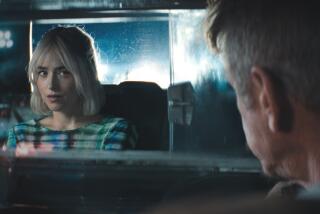Fares of the heart
- Share via
A man gets into a taxicab. Or a woman gets into a taxicab. Or a man and a woman, or a man and two women get into a taxicab. The cab pulls away, the driver says something like, “So how are you doing tonight?” and a conversation starts.
Apart from the odd sex act, that is pretty much all there is to “Taxicab Confessions,” the Emmy-winning HBO hidden-camera documentary series, which returns to television this Saturday. It is only the 11th episode since its debut in 1995 (two more follow over the course of the coming year), which is not very many in TV terms, but a lot as compared with, say, “Star Wars” movies. And it has made its mark, having been parodied on “Saturday Night Live” and “The Simpsons,” two clear signs of cultural penetration.
Notwithstanding the simplicity of its premise, and the lurid promise of its title, “Taxicab Confessions” is a serious show, unexpectedly deep and poetic and moving. Its appeal may be voyeuristic -- “It seems like it’s going to be, you know, an ‘HBO cha cha’ show,” says Sheila Nevins, who shepherds the network’s documentary division and helped develop the series, but its heart is pure, its overriding theme the search for love.
Produced by brothers Joe and Harry Gantz, the series recalls Walker Evans’ surreptitious subway portraits of 1938 to 1941, in which the photographer strove to be an invisible, neutral recorder. It’s not that the series takes no point of view -- obviously it takes the point of view that these are stories worth telling, and in so doing automatically lends them dignity, where many reality shows seek mainly to strip dignity away. “Taxicab Confessions” reserves judgment, and in giving undoctored airtime to an array of characters, apparently mainstream or deceptively marginal -- people who TV would normally either ignore or exploit -- reminds the viewer that there are more things in heaven and earth than are dreamt of in his philosophy. It is possibly the most spiritual and the most sensual show on television.
Save for a sequence in which a woman talks about her experiences on 9/11 and its effect on her fireman ex-boyfriend, Saturday’s edition is fairly upbeat and often comical: A couple of Irishmen discuss their misadventures during a blackout; a young man relates how his girlfriend would take calls from her mother while they were having sex; a mother, daughter and son-in-law compare and contrast their courting; a young man expresses his love for his transsexual girlfriend, who muses ruefully on the limits of her femaleness. There is a bit of making out, and what used to be called “heavy petting,” and a surprising rendition of the song “One Boy,” from the musical “Bye Bye Birdie.” The riders come in all colors.
The Gantzes have been making human-nature films for 16 years. Their first, called “Couples Arguing,” was exactly what its title described. “We worked with couples,” Joe Gantz says, and “whenever they began to argue night or day, they’d beep us, we’d rush over there, we’d videotape their arguments in progress.” Partially financed by England’s Channel 4, and distributed internationally, it earned a profit and led the brothers to “the mistaken opinion that you could make any crazy documentary.”
“Taxicab” is kin to an earlier Gantz project called “A Life at Random,” a proposed talk show in which an ordinary citizen, selected through a process involving a roulette wheel, a dartboard and blind pointing, would be invited, Joe says, “to come on and talk about the events that shaped their life. We got really interesting stories. But when we tried to sell it to broadcasters they were afraid to do a show where they knew nothing about their guests.”
“Taxicab Confessions” is “A Life at Random” set in the back of a car. “It was evident right away that this was a perfect venue,” Harry says. “There’s something about a cab, in which you either get in off the cold streets into a warm cab or off the warm streets into a cool cab, and the only eye contact is through the rearview mirror, and you have a friendly driver, and if that driver provides an open ear, and you have a story to tell, it’s amazing how people will tell that story.”
It doesn’t even matter whether the story is “true,” only that it’s true for the person telling it. If he or she puts up a front, it’s only the everyday sort of front we all use with one another -- in other words, an authentic front. Under these terms, even those who lie, lie honestly. They aren’t trying to win a prize or look good on television. Because they have no idea that they’re on television.
Back to New York City
The new edition returns the show to New York City, its original location and the world capital of taxidom. The Gantzes shot for several years in Las Vegas because, as Nevins recalls, the New York Taxi & Limousine Commission under Mayor Giuliani “didn’t like our show -- they thought it was too R-rated, or too hard-R-rated. And under the guise that it wasn’t safe -- whatever that meant -- we couldn’t get a permit to shoot.” (They chose Las Vegas as an alternative in part because Nevada, like New York, is a “one-party consent state” -- legally, only the driver has to know the conversation is being recorded, though for it to be aired requires everyone’s knowledge and consent.) When a new mayor and a new taxi commissioner took office, Nevins prevailed upon the city to let them return.
To make one show, the brothers are on the streets six nights a week for six weeks, “from sundown to sunup.” One brother or another follows the taxi in a chase vehicle, monitoring the picture and sound and suggesting questions through a wireless receiver in the taxi driver’s ear. “It’s always an incredible rush to get behind that cab and hear people’s stories,” Harry says. The drivers, all professional cabbies, are auditioned “to find the few that are able to feel totally comfortable, incorporate our questions, get them there in a timely manner. It’s a hard job.” Out of 400 or 500 taped rides, they will use perhaps 10.
“We really try to think about where we’d get the best rides,” Joe says. “And we’re always surprised, because as we’re en route to this great idea someone flags us down and that’s the great ride. If anybody is being passed by cabs or if somebody gets out of a cab because the driver refuses to take them home because they don’t like the neighborhood, or they don’t like their looks, we always zip over and take ‘em, because we figure there’s a story there.”
It can seem astonishing that, having exposed themselves in sometimes more ways than one, passengers sign release forms. About a third of those asked refuse. But, Joe says, people have talked about just about everything. “People have talked about murders in the cab and signed a release, people have done drugs in the cab on camera and signed a release. The world is kind of divided up into people who will reveal who they are on a deep level, and people who won’t.”
“The people who really let their heart out tend to be the ones who willingly sign the release,” Nevins says, “because they want someone to know their story.”
“Often as a ride is winding down and we’re starting to tell them about what we’re doing, we say, ‘That was a great story,’ ” Joe says. “And they say something like, ‘Yeah, one day I want to write a book about my life.’ Philip Roth is very out there about talking about his life. Eminem is out there talking about his life. But most people don’t have that outlet. This is a medium where they’ve done it without realizing it.”
Saturday’s episode ends on a particularly joyous note, as a trio of young people strip to the waist and sing “I Will Survive” with verve and attitude. It’s no “Girls Gone Wild” moment, or even remotely sexual, but just a sudden bit of Eden in the New York night.
“You just want to cry for their happiness,” Nevins says. “I mean, that doesn’t happen, couldn’t happen, in a movie, could it? And they love each other, and they like the driver and they like New York. It’s so full of life, it’s so invigorating in such a depressing world. We have so little to believe in, people are constantly betraying us -- so to see simple people you can ... revere on some level, it’s worth it.”
More to Read
The complete guide to home viewing
Get Screen Gab for everything about the TV shows and streaming movies everyone’s talking about.
You may occasionally receive promotional content from the Los Angeles Times.







